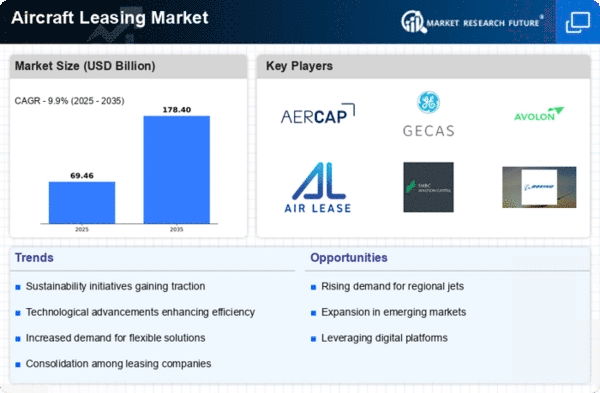Top Industry Leaders in the Aircraft Leasing Market

AerCap (Ireland)
Air Lease Corporation (US)
BOC Aviation (Singapore)
GECAS (US)
BBAM LLC (Australia)
CIT Commercial Air (US)
Aviation Capital Group (US)
Boeing Capital Corporation (US)
SAAB Aircraft Leasing (Sweden)
International Lease Finance Corporation (US)
Strategies Adopted
AerCap Holdings N.V., headquartered in Dublin, Ireland, stands out as the world's largest aircraft leasing company. With a fleet spanning various aircraft types and sizes, AerCap's strategy revolves around portfolio diversification, risk management, and strong customer relationships. The company's ability to offer flexible leasing solutions and adapt to market trends has solidified its position as a frontrunner in the industry.
Air Lease Corporation, based in Los Angeles, California, is another key player contributing significantly to the competitive landscape. The company focuses on a younger fleet, emphasizing fuel efficiency and technological advancements. Air Lease Corporation's strategy centers around long-term leases and maintaining a modern and technologically advanced fleet, catering to airlines' demand for fuel-efficient and environmentally friendly aircraft.
General Electric Capital Aviation Services (GECAS), a subsidiary of General Electric, has a robust global presence and a diverse portfolio of aircraft. GECAS employs a comprehensive approach to leasing, encompassing short-term and long-term leases, as well as aircraft trading and financing solutions. The company's wide-ranging services and strategic partnerships with airlines contribute to its sustained market leadership.
In the quest for market share, these key players deploy various strategies. Fleet expansion, geographical diversification, and technological innovation are common themes. Fleet expansion involves acquiring and leasing new aircraft to cater to the evolving needs of airlines globally. Geographical diversification enables companies to tap into emerging markets with high growth potential. Technological innovation, particularly in the realm of fuel efficiency and sustainability, aligns with the aviation industry's increasing focus on environmental responsibility.
Emerging Companies
Market share analysis in the aircraft leasing sector is influenced by several factors. Fleet size and composition, customer relationships, financial strength, and global reach are key determinants. The ability to secure long-term contracts and provide flexible leasing solutions also contributes significantly to market share. Companies adept at understanding and adapting to airline preferences, regulatory changes, and economic fluctuations are better positioned to gain and maintain a larger market share.
Amidst the established players, new and emerging companies are making strides, injecting further dynamism into the competitive landscape. Avolon, headquartered in Dublin, Ireland, has rapidly ascended as a major player. The company's strategy involves a focus on young, fuel-efficient aircraft and strategic partnerships. Avolon's nimble and innovative approach has allowed it to carve a niche in the competitive market, challenging the dominance of more established players.
CDB Aviation, a subsidiary of China Development Bank Financial Leasing Co., is another emerging force in the aircraft leasing sector. With a strong focus on the Asia-Pacific region, CDB Aviation leverages its strategic location and financial backing to expand its presence in the market. The company's emphasis on regional growth aligns with the increasing demand for air travel in Asia, positioning it as a key player in the evolving landscape.
Industry news reflects the ever-changing dynamics of the aircraft leasing market. Trends such as the shift towards greener aviation, the impact of geopolitical factors on leasing decisions, and the evolving financing landscape shape the industry narrative. The COVID-19 pandemic has also introduced new challenges, with leasing companies adapting to changes in demand, airline operations, and financial uncertainties. Industry news becomes a crucial aspect of staying abreast of these developments and anticipating their implications on the competitive scenario.
Current company investment trends in the aircraft leasing market revolve around sustainability, digitalization, and fleet optimization. With a growing emphasis on environmental responsibility, leasing companies are increasingly investing in fuel-efficient and eco-friendly aircraft. Digitalization efforts focus on enhancing operational efficiency, streamlining leasing processes, and providing data-driven insights for better decision-making. Fleet optimization involves assessing and adjusting the composition of leased aircraft to align with market demands and emerging trends.
The overall competitive scenario in the aircraft leasing market remains fluid, characterized by a delicate balance between established players, new entrants, and market forces. Strategic agility, innovation, and a keen understanding of industry dynamics are paramount for companies seeking to thrive in this competitive landscape. As the aviation industry continues to evolve, the aircraft leasing market is poised for further transformation, with companies navigating challenges and seizing opportunities to secure their positions in this dynamic and crucial sector.
Market news :Top of Form
According to Research Global key companies of industry giants boast extensive aircraft portfolios and global reach, leveraging economies of scale and diverse customer bases to maintain a competitive edge.











